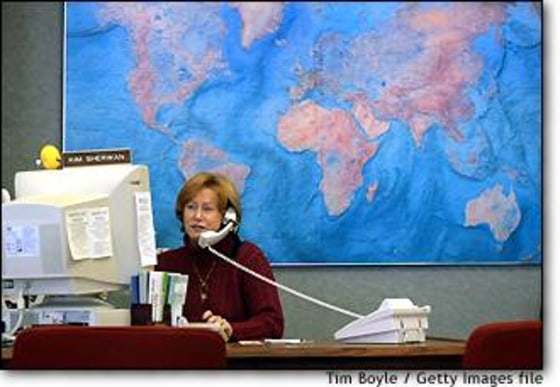With so many Web sites offering consumers discount airfares and low-cost hotel rooms, you’d be forgiven for thinking that garden-variety travel agents all have one-way tickets to Dinosaur Land. But travel agents are still a force to be reckoned with, despite increased competition from the likes of Expedia, Orbitz and Travelocity.
Since the Sept. 11 attacks, fears of more terrorism and the struggling economy have all put a crimp on consumers’ travel plans, and they have also made life harder for your average travel agent.
What’s more, a growing number of Web sites offer consumers an easy way to hunt for discounted flights, cruises, hotel rooms and rental cars. And earlier this year, the airlines cut to zero the commissions they have traditionally paid out to travel agents for selling their tickets.
But despite the setbacks, the travel agent has yet to go follow the same path as the dodo bird.
According to Jupiter Research, agents remain an important part of the travel industry, selling about 80 percent of all airline tickets purchased in the United States and accounting for around 70 percent of all the travel bookings made.
Agents still sell over 90 percent of the cruises, package tours and about half of the hotel rooms booked in the United States, according to the American Society of Travel Agents, which represents about 13,000 travel agencies. And while the airlines might have cut their commissions, agents still receive healthy commissions for sales of cruises and hotel rooms.
“A lot of the talk in the press has been about the imminent demise of the travel agent and the rise of the online travel business, but I think that’s a bit premature,” said Jared Blank, a travel analyst at Jupiter.
Web no significant threat
While the elimination of commissions by the major airlines has hurt some smaller mom-and-pop travel businesses, larger firms have diversified and consolidated says Blank, adding that although traffic to online travel sites is growing, the Web doesn’t pose a significant threat to agents’ dominance in the travel business.
In 2002, 13 percent of all U.S. travel will be booked using the Web, according to Blank. That number is projected to grow to 22 percent by 2007, he added. “So even in five years’ time the vast majority of all travel booked will be done through the offline channel.”
But as competition grows, travel agents are finding they must specialize, or focus on selling more lucrative travel products, in order to survive.
A good travel agent understands the intricacies of the travel business, analysts and agents argue. For this reason, many are focusing on niche markets, seeing their service as selling expertise rather than simply selling products.
“Increasingly, we’re seeing travel agents becoming specialists in certain areas, like vacations in France or Caribbean cruises,” said Jupiter’s Blank. “They have a depth of knowledge about a destination or a type of vacation. That’s something that a Web site still can’t offer and people are still willing to pay for that expertise.”
Prying open the cabin door
For John Dekker, a travel agent in Huntington Beach, Calif., good service is necessary for doing good business. When two of Dekker’s clients called him recently, requesting seats on a sold-out flight to London, he worked the phone and found the spaces.
“The flight was completely full, but because of my partnerships in the travel business I was able to call the station manager at LAX and get those seats for my clients,” said Dekker, who runs a franchise of Carlson Wagonlit Travel. “Providing that level of service to my clients has been a key to the growth of my business,” he said.
Dekker concedes that business has been difficult in recent years, but he says he has adapted by working to develop alliances with a handful of major airlines, from which he derives large incentive commissions for selling tickets to his clients.
“If I can sell my preferred carriers, I make more money from the commissions,” Dekker added.
Henry Harteveldt, a travel analyst at Forrester Research, says he thinks that economic difficulties will cause the number of travel agencies in the United States to decline by about 20 percent over the next 3 to 5 years.
“I don’t think travel agents will become extinct, but I do think they might become an endangered species,” Harteveldt said. “The agents who survive will need to be sharp to survive. They’ll be accredited travel professionals and not just ticket sellers. You’ll pay them for a service the same way you pay an attorney for advice or pay an accountant to do your taxes.”
